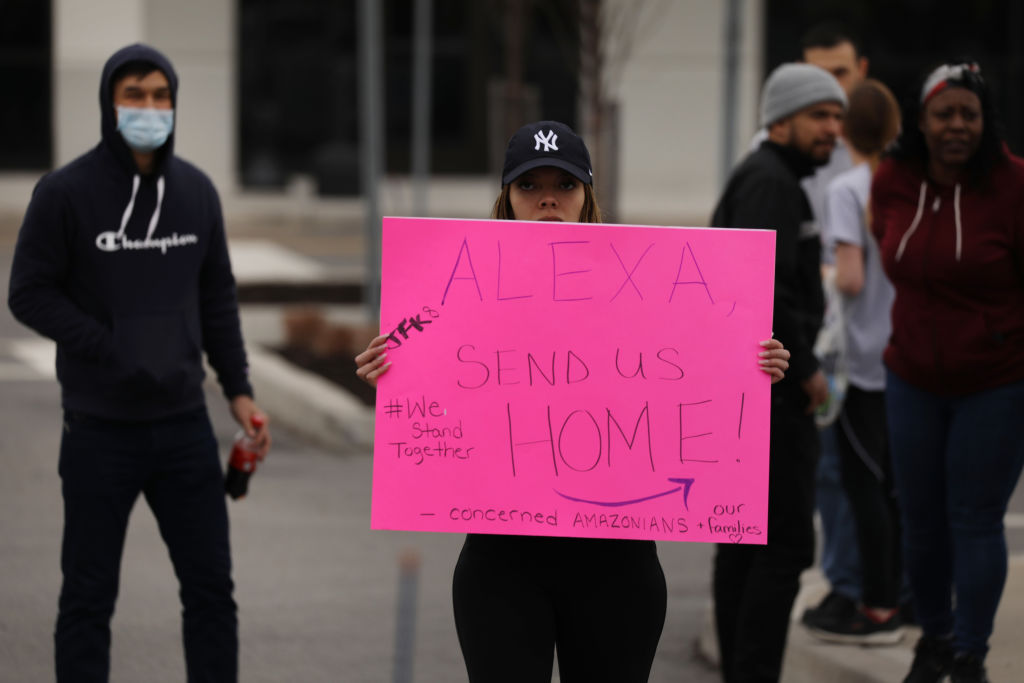Big Tech’s fast-and-dirty employment honeymoon is over as Amazon unionises

COULD you imagine a better name for someone making their mark out of being the Little Guy than Chris Smalls? It’s a story ready-made for a Netflix series. So it’s curious its success has taken Amazon – the company borne out of peddling cheap books – by surprise.
Smalls is the leader of the tech giant’s very first union. After a relentless campaign complete with free doughnuts doled out at the nearby bus stop, the workers for his warehouse voted to unionise.
Amazon has made a matzah off of the backs of poorly-paid factory workers for years. We’ve seen a handful of investigations into the working conditions and heard about the company spying on its staff to check if social-distancing rules were being broken.
The surprise for Amazon should be that it took this long. Incredibly, they are still playing catch-up.
The tech giant is reported to be hatching a plan to simply bury the problem by banning the word “union” and other key words – “compensation” and “slave labour” – on an internal social media app set to launch in the coming months.
If the idea was to boost employee satisfaction, this isn’t it.
Tech giants are facing a reckoning on multiple fronts, but the responsibilities owed to their employees are often downgraded in favour of dealing with antitrust and transparency concerns.
In the UK, Uber drivers have been in a face-off with the tech platform over the shoddy amount of compensation they get per ride. Here, at least, a competitive market has benefited them. Even after a deal with the once all-powerful GMB Union, Uber has struggled to keep drivers on the platform.
Last year, I bore witness to an anecdote made possible by exceptional timing. Only moments after leaving an event hosted by Uber I heard two women complaining about how hard it was to get a ride lately. The friend’s refrain is now ubiquitous in Central London on a Saturday night: “I’ll try Bolt”.
The unions’ failure to get their hooks into the staff of Big Tech is on one level, astonishing. Both their waning power and the fierce competition in these markets have protected Silicon Valley bosses from this particular assault. But this reprieve may be over.
Over the pandemic, the capital’s streets became flooded with a kind of food ninja. The all-in-black, helmeted moped driver armed with a pizza box. For these drivers, speed is key. While they are not rewarded explicitly for speed, the quicker they deliver one order, the quicker they can get to the next and the more they earn. The same is true, of course, for taxi drivers. But where cabbies would have to deal with irate passengers in a jerky journey, food delivery drivers only have the integrity of a margherita to contend with.
The creation of super-fast grocery deliveries has put speed as the competitive factor. What happens if a moped drives into a toddler because they were trying to earn an extra £5 that hour? Their employer will be hauled in front of either a legal court – or the one of public condemnation – for creating an environment incentivising dangerous driving.
Tech companies have benefited from a race-to-the-bottom on prices, but now they’re struggling with employees pushing back against the complicated working conditions that are the corollary effect of those low prices. Unions are an age-old defence for workers. London can still be brought to a standstill by a handful of disgruntled tube drivers. So it shouldn’t have taken a man with a name ready-made for being the Underdog for Amazon and its ilk to be alive to the threat.
